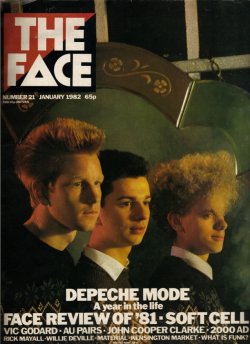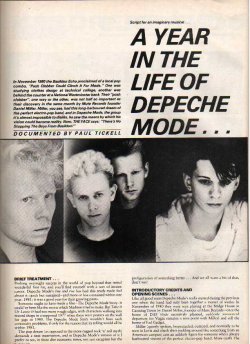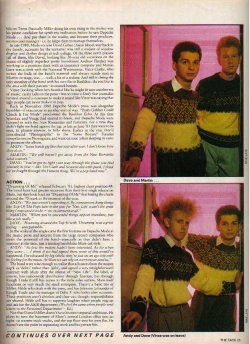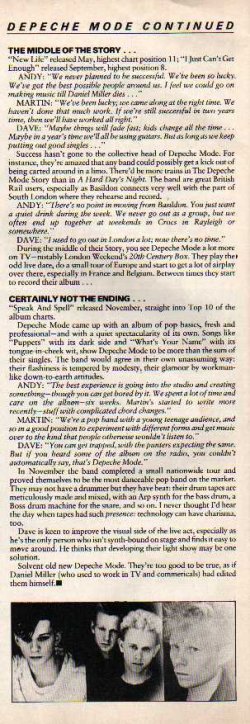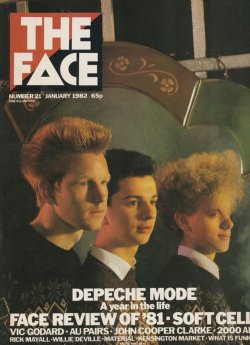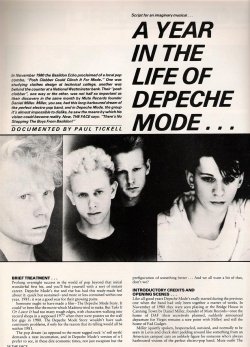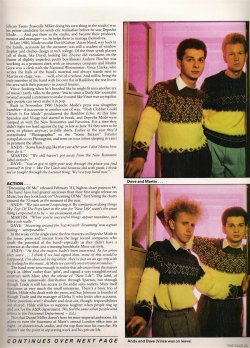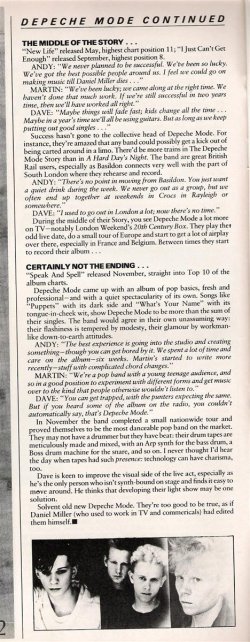You are using an out of date browser. It may not display this or other websites correctly.
You should upgrade or use an alternative browser.
You should upgrade or use an alternative browser.
Depeche Mode A Year In The Life Of Depeche Mode (The Face, 1982)
- Thread starter demoderus
- Start date
An intelligently-written, fairly detailed "the story so far"-type article, with contributions from the band minus Vince, laying emphasis on how the band had managed to become successful in such a brief space of time. Easy to read, but less naive banter and more solid fact makes it of especial use to someone interested in how the band fitted in with the workings of the music industry.
"Success hasn't gone to the collective head of Depeche Mode. For instance, they're amazed that any band could possibly get a kick out of being carted around in a limo. There'd be more trains in The Depeche Mode Story than in A Hard Day's Night."
A YEAR IN THE LIFE OF DEPECHE MODE
In November 1980 the Basildon Echo proclaimed of a local pop combo, "Posh Clobber Could Clinch It For Mode." One was studying clothes design at technical college, another was behind the counter at a National Westminster bank. Their "posh clobber", one way or the other, was not half so important as their discovery in the same month by Mute Records founder Daniel Miller. Miller, you see, had this long-harboured dream of the perfect electro-pop band, and in Depeche Mode, the group it's almost impossible to dislike, he saw the means by which his vision could become reality. Now, THE FACE says: "There's No Stopping The Boys From Basildon!"
BRIEF TREATMENT...
Prolong overnight success in the world of pop beyond that initial wonderful first hit, and you'll find yourself with a sort of instant career. Depeche Mode's rise and rise has had this ready made feel about it: quick but sustained - and more or less contained within one year. 1981: it was a good year for their growing pains.
Someone ought to have made a film - The Depeche Mode Story. It could've been like the movie which Madness tried to make. But Take It Or Leave It had too many rough edges, with characters walking into record shops in a supposed 1977 when there were posters on the wall for gigs in 1980. The Depeche Mode Story wouldn't have such continuity problems, if only for the reason that its telling would all be within 1981.
The pop dream (as opposed to the more ragged rock 'n' roll myth) demands a neat incarnation, and in Depeche Mode's version of it I prefer to see, in these dire economic times, not just escapism but the prefiguration of something better...And we all want a bit of that, don't we?
INTRODUCTORY CREDITS AND OPENING SCENES...
Like all good years Depeche Mode's really started during the previous one when the band had only been together a matter of weeks. In November of 1980 they were seen playing at the Bridge House in Canning Town by Daniel Miller, founder of Mute Records - once the home of DAF (their secretively planned, suddenly announced departure for Virgin remains a sore point with Miller) and still the home of Fad Gadget.
Miller (quietly spoken, bespectacled, outsized, and normally to be seen in Levis and check shirt padding around like something from an American campus) cuts an unlikely figure for someone who's always harboured visions of the perfect electro-pop band. Mute outfit The Silicon Teens (basically Miller doing his own thing in the studio) was his prime candidate for synth-etic realisation before he saw Depeche Mode...And put them in the studio, and became their producer, mentor and manager - i.e. he helps them to manage themselves.
In late 1980, Mode vocalist David Gahan (Asian blood, way back in the family, accounts for the surname) was still a student of window display and clothes design at tech college. Of the three synth players (all of them, like David, looking like 20-year old variations on the theme of slightly imperfect pretty boyishness) Andrew Fletcher was working as a pensions clerk with an insurance company and Martin Gore was a clerk with the National Westminster. Vince Clarke, who writes the bulk of the band's material and always stands next to Martin on stage, was...well, a bit of a recluse. And still is: being the only member of the band with his own flat in Basildon; the rest live in the area with their parents - in council houses.
Vince (looking when he's bearded like he might fit into another era of music) rarely talks to the press - less so since a Daily Star journalist twisted around a statement to make it sound like Vince was saying ugly people can never make it in pop.
Back in November 1980 Depeche Mode's press was altogether humbler - if inaccurate in another sort of way. "Posh Clobber Could Clinch It For Mode" proclaimed the Basildon Echo. At this time Spandau and Visage had started to break, and Depeche Mode were lumped in with the New Romantics and Futurists. For a time they didn't fight too hard against the tag: as late as June '81 they were to be seen, in photos anyway, in frilly shirts. Earlier in the year they'd contributed 'Photographic' to the 'Some Bizzare' Futurist compilation on Phonogram, and went on tour (often sleeping in vans) to promote the album.
ANDY: "Some bands gig like that year after year. I don't know how they do it."
MARTIN: "We still haven't got away from the New Romantic label entirely."
DAVE: "You've got to fight your way through the phase you find yourself in first - like The Clash and Siouxsie did with the punk. I think we've fought through the Futurist thing. We're a pop band now."
ACTION...
'Dreaming Of Me' released February '81, highest chart position 44 [1]. The band have had greater successes than their first single release on Mute, but they look back on 'Dreaming Of Me' first hitting the charts around the 70 mark as the moment of the year.
ANDY: "We just weren't expecting it. By comparison doing things like Top Of The Pops later in the year for 'New Life' wasn't the great thing I expected it to be - no excitement at all."
MARTIN: "When you're successful things appear mundane, just like a job really."
DAVE: "Hovering around the Top 40 with 'Dreaming' was a great feeling - unrepeatable."
In the wake of the single came the first features on Depeche Mode in the music press and interest from the large record companies who smelt the potential of the band - especially as they didn't have a contract at the time, just a trusting handshake Mute-ual style.
ANDY: "At first the majors hadn't been interested. As for when they were...I think if we had signed then, none of this would've happened. I'm obsessed by big labels: they're just on an ego trip with no feeling for the music. At Mute we can rely on everyone around us."
The band were wise enough to realise that advances from the majors work as 'debts' rather than 'gifts', and signed a very straightforward contract with Mute after the release of 'New Life'. The label, of course, has nationwide distribution through Spartan, but through Rough Trade it still has access to the indie sales outlets. Mute itself functions as very much the small enterprise. There's a basic trio of Miller, Hilde who deals with the press, and Sue Johnson (a founder of Rough Trade and the manager of Delta 5) who looks after accounts. These positions aren't absolute and clear-cut, though: responsibilities are shared. Hilde still has to suppress laughter when people ring up and ask for the A&R department. (We feel the same when people send letters to the Personnel Department - Ed.)
Not that Daniel Miller doesn't have his mini-imperial ambitions. He plans to turn the basement of Mute's central London office into an eight- or sixteen-track studio, and the top floor into his own flat. He doesn't see the point in separating work and his private life.
Last edited:
THE MIDDLE OF THE STORY...
'New Life' released May, highest chart position 11; 'I Just Can't Get Enough' [sic] released September, highest position 8.
ANDY: "We never planned to be successful. We've been so lucky. We've got the best possible people around us. I feel we could go on making music till Daniel Miller dies..."
MARTIN: "We've been lucky; we came along at the right time. We haven't done that much work. If we're still successful in two years' time, then we'll have worked all right."
DAVE: "Maybe things will fade fast; kids change all the time...Maybe in a year's time we'll all be using guitars. But as long as we keep putting out good singles..."
Success hasn't gone to the collective head of Depeche Mode. For instance, they're amazed that any band could possibly get a kick out of being carted around in a limo. There'd be more trains in The Depeche Mode Story than in A Hard Day's Night. The band are great British Rail users, especially as Basildon connects very well with the part of South London where they rehearse and record.
ANDY: "There's no point in moving from Basildon. You just want a quiet drink during the week. We never go out as a group, but we often end up together at weekends in Crocs in Rayleigh or somewhere."
DAVE: "I used to go out in London a lot; now there's no time."
During the middle of their Story, you see Depeche Mode a lot more on TV - notably London Weekend's 20th Century Box. They play the odd live date, do a small tour of Europe and start to get a lot of airplay over there, especially in France and Belgium. Between times they start to record their album...
CERTAINLY NOT THE ENDING...
'Speak And Spell' released November, straight into Top 10 of the album charts.
Depeche Mode came up with an album of pop basics, fresh and professional - and with a quiet spectacularity of its own. Songs like 'Puppets' with its dark side and 'What's Your Name' with its tongue-in-cheek wit, show Depeche Mode to be more than the sum of their singles. The band would agree in their own unassuming way: their flashiness is tempered by modesty, their glamour by workmanlike down-to-earth attitudes.
ANDY: "The best experience is going into the studio and creating something - though you can get bored by it. We spent a lot of time and care on the album - six weeks. Martin's started to write more recently - stuff with complicated chord changes."
MARTIN: "We're a pop band with a young teenage audience, and so in a good position to experiment with different forms and get music over to the kind that people otherwise wouldn't listen to."
DAVE: "You can get trapped, with the punters expecting the same. But if you heard some of the album on the radio, you couldn't automatically say, that's Depeche Mode."
In November the band completed a small nationwide tour and proved themselves to be the most danceable pop band on the market. They may not have a drummer but they have beat: their drum tapes are meticulously made and mixed, with an Arp synth for the bass drum, a Boss drum machine for the snare, and so on. I never thought I'd hear the day when tapes had such presence: technology can have charisma, too.
Dave is keen to improve the visual side of the live act, especially as he's the only person who isn't synth-bound on stage and finds it easy to move around. He thinks that developing their light show may be one solution.
Solvent old new Depeche Mode. They're too good to be true, as if Daniel Miller (who used to work in TV and commercials) had edited them himself.
'New Life' released May, highest chart position 11; 'I Just Can't Get Enough' [sic] released September, highest position 8.
ANDY: "We never planned to be successful. We've been so lucky. We've got the best possible people around us. I feel we could go on making music till Daniel Miller dies..."
MARTIN: "We've been lucky; we came along at the right time. We haven't done that much work. If we're still successful in two years' time, then we'll have worked all right."
DAVE: "Maybe things will fade fast; kids change all the time...Maybe in a year's time we'll all be using guitars. But as long as we keep putting out good singles..."
Success hasn't gone to the collective head of Depeche Mode. For instance, they're amazed that any band could possibly get a kick out of being carted around in a limo. There'd be more trains in The Depeche Mode Story than in A Hard Day's Night. The band are great British Rail users, especially as Basildon connects very well with the part of South London where they rehearse and record.
ANDY: "There's no point in moving from Basildon. You just want a quiet drink during the week. We never go out as a group, but we often end up together at weekends in Crocs in Rayleigh or somewhere."
DAVE: "I used to go out in London a lot; now there's no time."
During the middle of their Story, you see Depeche Mode a lot more on TV - notably London Weekend's 20th Century Box. They play the odd live date, do a small tour of Europe and start to get a lot of airplay over there, especially in France and Belgium. Between times they start to record their album...
CERTAINLY NOT THE ENDING...
'Speak And Spell' released November, straight into Top 10 of the album charts.
Depeche Mode came up with an album of pop basics, fresh and professional - and with a quiet spectacularity of its own. Songs like 'Puppets' with its dark side and 'What's Your Name' with its tongue-in-cheek wit, show Depeche Mode to be more than the sum of their singles. The band would agree in their own unassuming way: their flashiness is tempered by modesty, their glamour by workmanlike down-to-earth attitudes.
ANDY: "The best experience is going into the studio and creating something - though you can get bored by it. We spent a lot of time and care on the album - six weeks. Martin's started to write more recently - stuff with complicated chord changes."
MARTIN: "We're a pop band with a young teenage audience, and so in a good position to experiment with different forms and get music over to the kind that people otherwise wouldn't listen to."
DAVE: "You can get trapped, with the punters expecting the same. But if you heard some of the album on the radio, you couldn't automatically say, that's Depeche Mode."
In November the band completed a small nationwide tour and proved themselves to be the most danceable pop band on the market. They may not have a drummer but they have beat: their drum tapes are meticulously made and mixed, with an Arp synth for the bass drum, a Boss drum machine for the snare, and so on. I never thought I'd hear the day when tapes had such presence: technology can have charisma, too.
Dave is keen to improve the visual side of the live act, especially as he's the only person who isn't synth-bound on stage and finds it easy to move around. He thinks that developing their light show may be one solution.
Solvent old new Depeche Mode. They're too good to be true, as if Daniel Miller (who used to work in TV and commercials) had edited them himself.
[1] - 'Dreaming Of Me' in fact peaked in the UK charts at 57.

